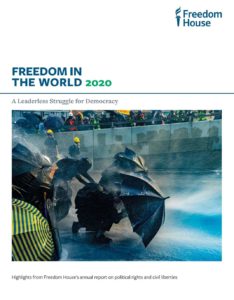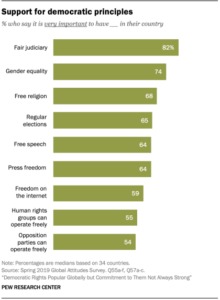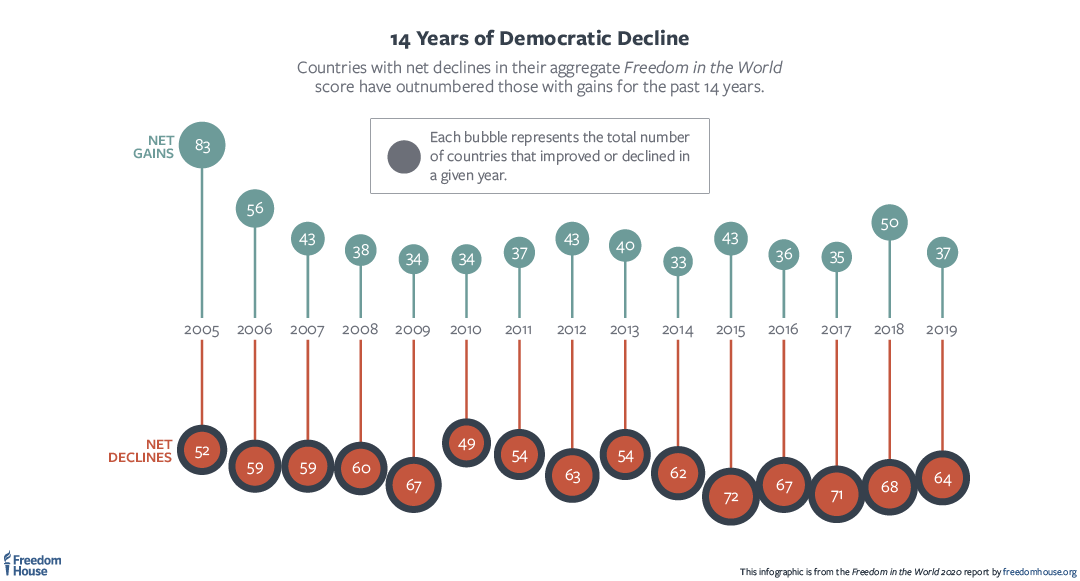The past twelve months registered the 14th consecutive year of decline in global freedom, according to Freedom in the World 2020, the latest survey of political rights and civil liberties in 210 states from Freedom House:
The gap between setbacks and gains widened compared with 2018, as individuals in 64 countries experienced deterioration in their political rights and civil liberties while those in just 37 experienced improvements. The negative pattern affected all regime types, but the impact was most visible near the top and the bottom of the scale. More than half of the countries that were rated Free or Not Free in 2009 have suffered a net decline in the past decade.
Leading democracies are not only failing to confront the authoritarian resurgence, the largest and arguably most influential democracies’ “drift from liberal democratic ideals is sending exactly the wrong message,” said Mike Abramowitz, president of Freedom House. “If major democratic powers fail to set strong examples and provide constructive leadership, it will be impossible to reverse the global trends that threaten freedom for all societies.”
Bright spots in an otherwise dismal outlook for freedom can be found in the pro-democracy protests in Hong Kong, Bolivia, Chile, Sudan, Russia, Algeria, India and Iran, he added. But the global struggle for democracy is lacking leadership.
 As VOA’s Arash Arabasadi reports (above), the group says individual freedoms and democratic systems are under attack. The report focuses on developments between January and December 2019.
As VOA’s Arash Arabasadi reports (above), the group says individual freedoms and democratic systems are under attack. The report focuses on developments between January and December 2019.
Key Findings
- Of the 195 countries assessed, 83 (43 percent) were rated Free, 63 (32 percent) were Partly Free, and 49 (25 percent) were Not Free. The share of Free countries has declined by 3 percentage points over the last decade, while the percentage of Partly Free and Not Free countries rose by two and one points, respectively.
- The gap between setbacks and gains widened. People in 64 countries experienced deterioration in their political rights and civil liberties in 2019, while those in just 37 countries experienced improvements. The difference was smaller in 2018, when 68 countries declined and 50 made gains.
- The countries with the year’s largest gains and declines were concentrated in Africa. Benin, Mozambique, and Tanzania suffered from flawed elections and state repression of dissent, while Sudan, Madagascar, and Ethiopia benefited from progress toward reform and more democratic rule.
- Most established democracies have experienced declines over the past 14 years. Of the world’s 41 established democracies as of 2005, defined as those that had been rated Free for each of the previous 20 years, 25 have since suffered net score declines.
- Mass protests yielded mixed results for each country or territory’s overall score. For example, Hong Kong slipped by four points due in part to acts of repression by police and pro-government thugs. Sudan’s score improved by five points after its protest movement paved the way for a power-sharing transitional government.
- As democratic states display faltering support for freedom on the international stage, authoritarian powers have expanded their global influence through proxy wars, election interference, and censorship beyond their borders.
 While autocrats are toiling to stamp out the last vestiges of domestic dissent and spread their harmful influence across the world, many freely elected leaders are dramatically narrowing their concerns to a blinkered interpretation of the national interest, adds Sarah Repucci, vice president for research and analysis at Freedom House, a partner of the National Endowment for Democracy (NED). In fact, such leaders are increasingly willing to break down institutional safeguards and disregard the rights of critics and minorities as they pursue their populist agendas, she observes:
While autocrats are toiling to stamp out the last vestiges of domestic dissent and spread their harmful influence across the world, many freely elected leaders are dramatically narrowing their concerns to a blinkered interpretation of the national interest, adds Sarah Repucci, vice president for research and analysis at Freedom House, a partner of the National Endowment for Democracy (NED). In fact, such leaders are increasingly willing to break down institutional safeguards and disregard the rights of critics and minorities as they pursue their populist agendas, she observes:
The unchecked brutality of autocratic regimes and the ethical decay of democratic powers are combining to make the world increasingly hostile to fresh demands for better governance. A striking number of new citizen protest movements have emerged over the past year, reflecting the inexhaustible and universal desire for fundamental rights. However, these movements have in many cases confronted deeply entrenched interests that are able to endure considerable pressure and are willing to use deadly force to maintain power. The protests of 2019 have so far failed to halt the overall slide in global freedom, and without greater support and solidarity from established democracies, they are more likely to succumb to authoritarian reprisals.
The Freedom House report follows another global survey on the state of global democracy from the Pew Research Center (above). “Democracy remains a popular idea among average citizens,” that 34-nation survey found, “but commitment to democratic ideals is not always strong.”








